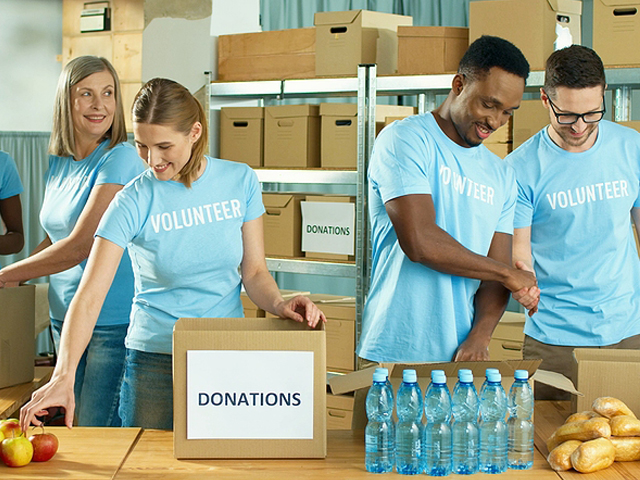
It is extremely valuable to donate your time and energy within your community and to organizations that you care about. Helping others and giving back offers numerous benefits. Spending time with animals, people and places can help you learn all sorts of important information about your personality, your strengths and your weaknesses. It may even provide you insight into what you would like to incorporate in a future career. Discover more volunteering benefits below:
Meet New and Interesting Individuals
You can gain valuable insights from the individuals you are helping out and fellow volunteers. Regardless of which groups you are working alongside, you will broaden your horizons once you begin communicating and sharing information. There are different ways to look at the world and find common ground. It is refreshing to hear from a variety of perspectives.
Show Commitment and Dedication To Colleges
Volunteer work looks great on your resume and your college application. It showcases your character and different interests. Admission officers will see the potential of what you can offer the campus and the benefits to the community. Listing your volunteer work offers a glimpse into your passions and what drives you. It shows that you enjoy giving back to the community and its members.
Gain Skills and Important Life Experiences
Getting into real hands-on work with volunteering is an excellent way to develop new skills in many areas. Working with others, communicating, being responsible, helping others or the planet are all valuable. Regardless, if you are building homeless shelters or spending time with neglected seniors, or walking dogs at the animal shelter, you are enhancing lives. Maybe you are conducting a garbage cleanup in your neighborhood by removing trash from the ditch. Perhaps, you decide to help the bees and the pollinators by spreading seeds.
The options are endless. Listen to your inner calling. If you need to plant trees or build bat habitats, do that. If you enjoy hearing historical stories from the elderly, go and spend time together. From extended care homes to helping your neighbors, volunteering your time to a worthy cause doesn’t have to be associated with a large organization.
Before You Begin Volunteering
To get the most out of your experience, ask yourself these questions before you get involved with an organization:
It is essential to ask yourself the following questions to make the most of your volunteer time:
- What skills and talents do I bring to the table?
- What types of people do I want to surround myself with?
- What tasks have I enjoyed completing in the past?
- How much time can I commit to, or which days of the week am I available?
- What can I see myself doing as a volunteer and which items are off the table?
- What do I hope to learn about with this opportunity?
Find Volunteer Opportunities That Support Your Career Interests
Are you studying to be a veterinarian? Or want to be a physiotherapist? What offices, clinics, shelters, or hospitals in your community could benefit from some hands-on help? Are you into culinary arts and dream of being a chef one day? Is there a food-truck weekly gathering or some local catering company that is swamped with weddings and graduations? Hone into where your skills could be the most valuable and start looking for opportunities.
Can I Receive Academic Credit?
Speak with your school counselor to discover if your high school offers any academic credit for service learning and volunteer work. These programs combine community service and hands-on learning. Maybe you can work with summer day camps for kids or do makeovers at a women’s shelter. Perhaps, you can help the seniors in your community retrieve their groceries or medications. There are many different options out there. From working in construction to working with people and animals. Maybe a local petting zoo or horse stable could use your skills. Think outside the box and speak with those who run the programs to get brainstorming.
While we would never recommend simply joining a program to receive credit, it is a great bonus if such a program already exists within your community. Many church groups and elderly associations have broad volunteer needs. From teaching art projects or sorting through community clothing and food donations, there are many ways to help people.
Getting Involved
Organizations everywhere need volunteers. Here are some ways to get started:
- Call local museums or cultural centers to inquire if they need help or can point you in a certain direction.
- Contact various community-based programs that pique your interest and inquire if they need help or have student jobs available.
- Ask community colleges, religious centers, and libraries if they host any volunteer groups.
- Check out your community website. There may be a list of volunteer options in your vicinity.
Where Do Your Favorite People Volunteer?
Speak with friends, work associates, parents, teachers, and teammates to discover what volunteer options are out there. If you are passionate about theatre and art, there are plenty of programs for kids during the summer. If building things is enjoyable, perhaps there is a community project or treehouse, or new fencing that is going up in your area. If sports are your passion, teams always seem to be short of referees and coaches. Maybe you love programming or typing? There are plenty of ways to contribute if you can find your niche.
Your Time, Energy & Vitality Are Priceless
Don’t’ think that you don’t have enough to offer. Simply being young, flexible, fit and full of energy is more than enough. If you maintain a positive attitude and can enjoy learning new things, you will do fine. Even a few hours of volunteering counts. If you try something and it isn’t a good fit or if you feel unsafe or don’t have enough direction, there are plenty of other places to spend your time.











